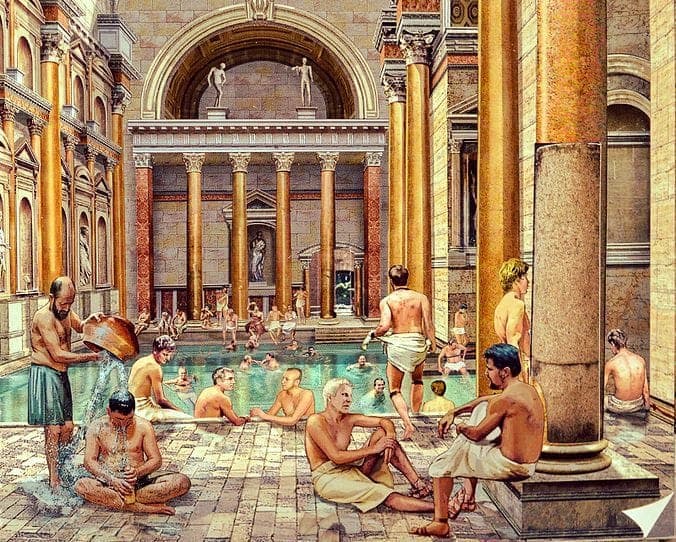On returning to the office
February 13, 2022
5 min read·— views

Now that the pandemic seems to be winding down and the call for workers to return to the office becomes stronger again I'm often reminded of Seneca's letter On Quiet and Study (published c. 65 AD).
In this letter, Seneca answers a question by his regular penfriend Lucilius about his study above a bathhouse. How is he able to concentrate with all that noise going on below him? Seneca's description of the bathhouse noises is hilarious and reminds me of working in large shared offices before the pandemic:
I have lodgings right over a public bathhouse. Now imagine to yourself every kind of sound that can make one weary of one's years. When the strenuous types are doing their exercises, swinging weight-laden hands about, I hear the grunting as they toil away – or go through the motions of toiling away – at them, and the hissings and strident gasps every time they expel their pent up breath. When my attention turns to a less active fellow who is contenting himself with an ordinary inexpensive massage, I hear the smack of a hand pummelling his shoulders, the sound varying according as it comes down flat or cupped. But if on top of this some ball player comes along and starts shouting out the score, that's the end! Then add someone starting up a brawl, and someone else caught thieving, and the man who likes the sound of his voice in the bath, and the people who leap into the pool with a tremendous splash. Apart from those whose voices are, if nothing else, natural, think of the hair remover, continually giving vent to his shrill and penetrating cry in order to advertise his presence, never silent unless it be while he is plucking someone's armpits and making the client yell for him! Then think of the various cries of the man selling drinks, and the one selling sausages and the other selling pastries, and all the ones hawking for the catering shops, each publicizing his wares with a distinctive cry of his own. 1
I've also had my fair share of annoying office noises and even though I don't recall any coworkers having their armpits plucked, the distractions are not any less. At least Seneca was studying above a bathhouse. We, as office workers, are right in the middle of all the noise. And what's worse: Anyone can tap on your shoulder any time.
I'm not particularly looking forward to returning to the din and distractions of daily office life. I remember the struggle of trying to concentrate with so much going on around me. I always felt drained at the end of the day and still had the feeling I hadn't accomplished all that much. So what does Seneca recommend?
In line with his stoic philosophy, he is convinced that when one is at peace within, all the noise outside does not interfere with this inner quiet. A person without inner turmoil should be able to withstand any noises and distractions around him.
I have so steeled myself against all these things that I can even put up with a coxswain's strident tones as he gives his oarsmen the rhythm. For I force my mind to become self-absorbed and not let outside things distract it. There can be absolute bedlam without so long as there is no commotion within, so long as fear and desire are not at loggerheads, so long as meanness and extravagance are not at odds and harassing each other. For what is the good of having silence throughout the neighbourhood if one's emotions are in turmoil? 1
Seneca recommends we should try to attain an inward detachment so that the chattering of coworkers, the grinding of coffee machines, and the incessant farewell parties of coworkers we've never met cannot interfere with our inner peace. Even the occasional tap on the shoulder, when you were just about to solve a particularly gnarly problem, should not disturb the inner quiet of a true stoic.
This is, perhaps, not the advice we were hoping for. But Seneca is also pragmatic and even though he is convinced that noise and distraction are a great way for stoics to practice their inner peace, looking for a quiet place to study is the easier solution.
'This is all very well,' you may say, 'but isn't it sometimes a lot simpler just to keep away from the din?' I concede that, and it is the reason why I shall shortly be moving elsewhere. What I wanted was to give myself a test and some practice. Why should I need to suffer the torture any longer than I want to when Ulysses found so easy a remedy for his companions even against the Sirens? 1
So, about going back to the office in our post-pandemic world. I think Seneca would agree that if your work involves any kind of thinking, you're better off at home, where it doesn't require the willpower of a stoic sage to get something done. Any visits to the office should therefore only be undertaken if one wants to strengthen one's stoic virtues.
Footnotes
-
Seneca. Letters from a Stoic (Classics S.) (p. 113). Penguin Books Ltd. Kindle Edition. ↩ ↩2 ↩3